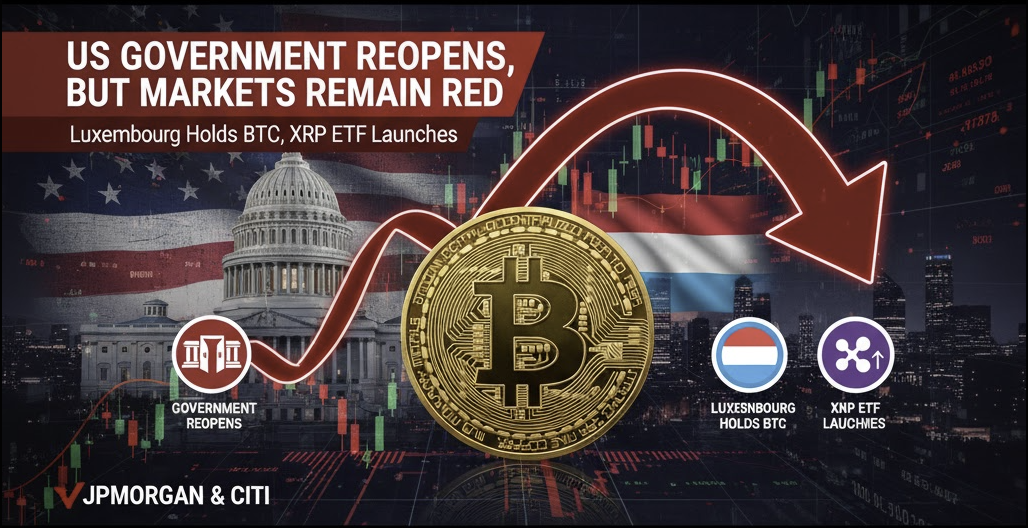The market continues to receive positive news on tariffs. In the crypto space, advancements in legislation are progressing in the United States and other major nations, solidifying its role as a key player in global finance.
Market Overview
US equities closed mixed on Tuesday, July 22nd. The Dow Jones and S&P 500 saw slight increases, while the Nasdaq experienced a minor dip. Stock futures showed mixed trends, with Nasdaq futures falling, and the other two indices slightly rising. Oil hovered around $66 per barrel. Gold remained stable at $3443 per ounce.
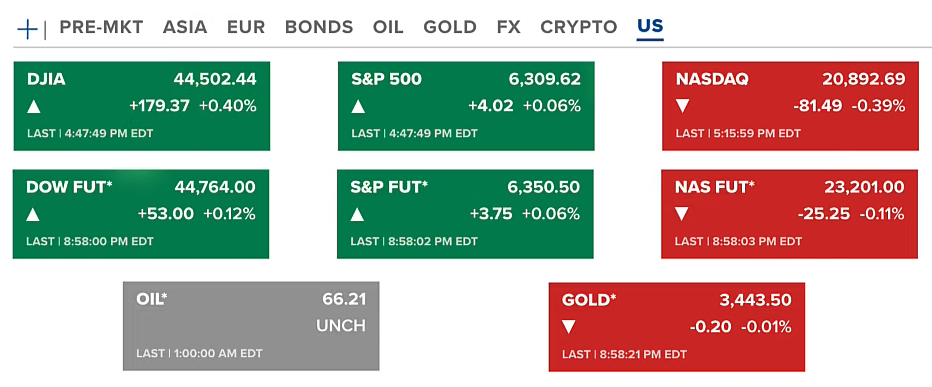
The crypto market continues to show positive signals today. Bitcoin's price, at the time of this report, fluctuates around the $119,700 mark, maintaining its position above $100,000 for 75 consecutive days without closing a candle below it, and 28 days without even touching the $100,000 level. Most major altcoins are seeing gains. The overall crypto market capitalization stands at $4 trillion.
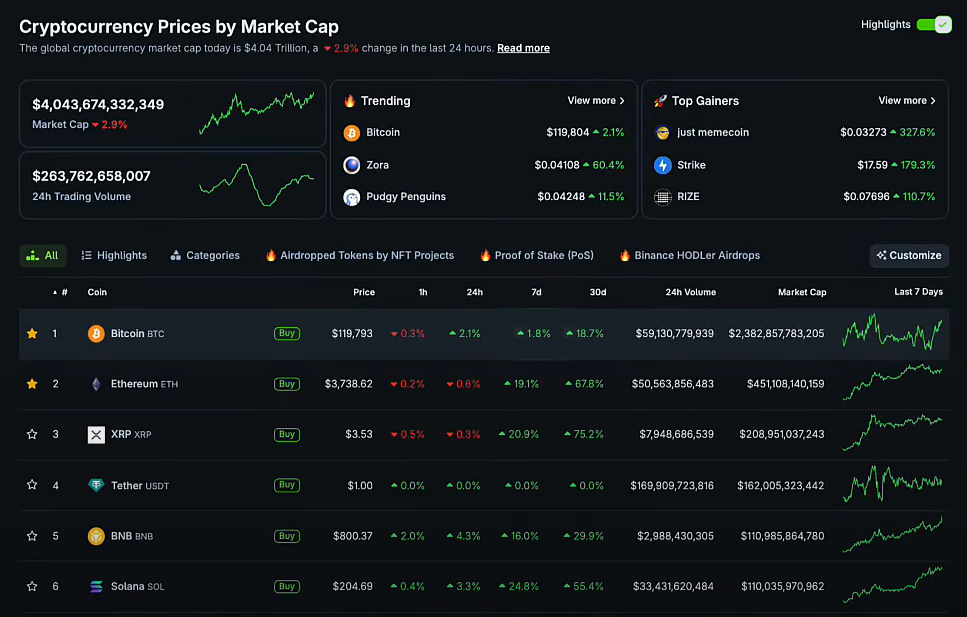
US Bitcoin spot ETFs ended Tuesday with net outflows of $68 million. In contrast, ETH spot ETFs saw strong inflows of $533 million. The SOL ETF also recorded $12.6 million in inflows. This mixed flow indicates a rotation within crypto ETFs, potentially favoring Ethereum.

Market sentiment has recently re-energized. Interest in Bitcoin on Google Trends has surged, particularly since Donald Trump's re-election and his vocal support for the crypto industry, with numerous policies being enacted, such as the GENIUS Act and the Clarity Act. Price appreciation is the primary driver behind this new wave of FOMO (Fear Of Missing Out). New users are entering the market drawn by profit opportunities, leading to the familiar cycle: price increases – capital inflows – widespread media attention – further price increases – and then a correction. However, after each cycle, the market always retains a segment of long-term conviction investors, who serve as a support for sustainable future development.
Looking back at previous cycles, Bitcoin's bottom in 2015 was around $200, in 2019 it was $3,500, and in 2022 it was $15,000. This demonstrates that each cycle has seen a higher low, reflecting steadily increasing confidence in Bitcoin. Ultimately, we observe that BTC's price may fluctuate in the short term, but its long-term trend remains upward. Those who patiently accumulate when the market is "quiet" will be the ones who benefit when the market enters an explosive growth phase.
Tariff Updates: US Inks Deals with Japan, China, Indonesia, and the Philippines
The tariff situation continues to evolve with new updates. However, the likelihood of a full-blown trade war has significantly decreased. Markets are still awaiting agreements between nations on tariffs, with numerous positive announcements emerging.
With Japan
President Donald Trump recently announced a major trade agreement with Japan, under which Tokyo has pledged to invest $550 billion in the United States, as directed by the US President. According to the agreement, the US will receive 90% of the profits from this investment, which is projected to create hundreds of thousands of jobs for American workers. Additionally, Japan has agreed to open its markets to US goods, including automobiles, trucks, rice, agricultural products, and other key exports. In return, Japanese exports to the US will face a reciprocal tariff rate of 15%. This significant deal underscores President Trump's focus on reciprocal trade and attracting foreign investment.
With China
US Treasury Secretary Scott Bessent stated he is likely to agree to extend the deadline for the trade agreement between the US and China during upcoming meetings scheduled in Stockholm, Sweden, next week. Previously, in mid-May, the two nations reached an agreement to suspend most high tariffs for 90 days to allow for continued negotiations, with the deadline set for August 12th.
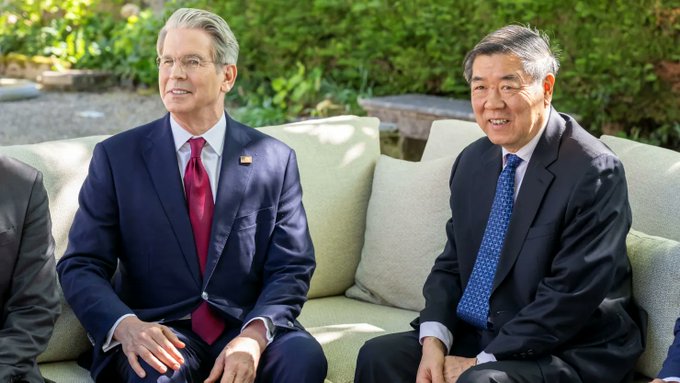
Speaking on Fox Business, Bessent affirmed, "we will work towards an extension agreement" in the Monday and Tuesday meetings, adding that US-China trade relations are currently in a "very good" state. He expects the negotiation process to include key issues such as reducing China's overproduction, encouraging it to develop its domestic consumer economy, and addressing concerns related to China's purchases of oil from Russia and Iran—two nations under US sanctions. Additionally, he hopes to clarify China's role in supporting Russia in the Ukraine conflict. Secretary Bessent emphasized that bilateral relations have now reached a "very constructive" level and expressed optimism that "we will be able to accomplish a great deal" in the coming period.
Currently, trade relations between China and the United States are in a sensitive phase. China's overproduction necessitates export markets like the US, while the US still relies on cheap goods from China, as it has not yet diversified its supply chains. Therefore, a temporary trade agreement is necessary, but in the long term, the US will gradually reduce its dependence on China, shifting production back home or to other countries like India. Conversely, China will need to boost domestic consumption and seek new markets.
With Other Countries
President Donald Trump recently officially announced a major trade agreement with Indonesian President Prabowo Subianto. Under the agreement, US exports to Indonesia will be completely tariff-free, while goods from Indonesia entering the US will face a 19% tariff. Indonesia has agreed to remove 99% of tariff barriers on US industrial, technological, and agricultural goods. Furthermore, this Southeast Asian nation has also pledged to provide strategic minerals to the US. The agreement also includes large contracts totaling tens of billions of dollars, including purchases of Boeing aircraft, agricultural products, and energy from the US.
Additionally, the Philippines has reached a nearly similar agreement. President Donald Trump recently met with Philippine President Ferdinand Marcos and his delegation at the White House. Within the framework of the meeting, the two sides signed a new trade agreement, under which US goods exported to the Philippines will be completely tariff-free, while goods from the Philippines entering the US will be subject to a 19% tariff. Beyond trade, the two countries also agreed to enhance military cooperation in the coming period.
New Crypto Legislation in the US: Shaping the Digital Frontier
Senators Tim Scott, Cynthia Lummis, Bill Hagerty, and Bernie Moreno recently unveiled a draft of new crypto legislation aimed at clarifying regulations for tokens, the roles of the SEC/CFTC, banking activities, and combating fraud. The senators are inviting public feedback on over 35 crucial issues.
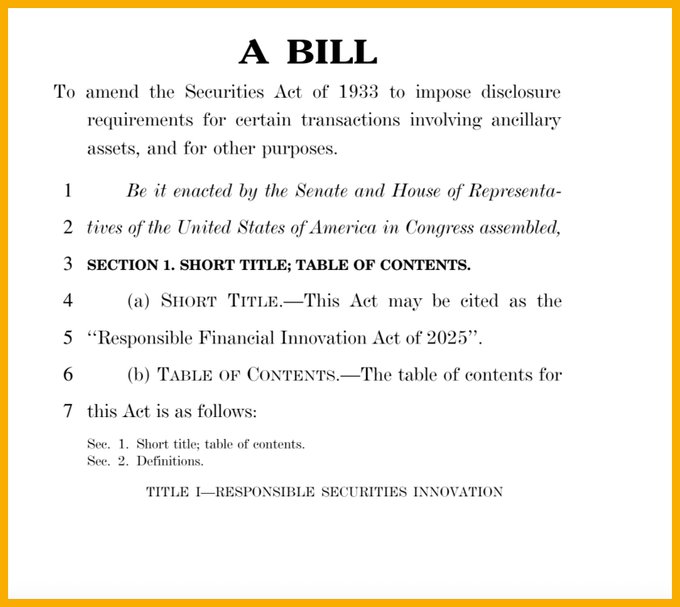
Here are the key points of this draft bill:
- Defines "ancillary assets" as crypto tokens linked to investment contracts that are not considered securities if they meet certain conditions.
- Requires issuers to disclose information periodically (twice a year) regarding their tokens, team, tokenomics, risks, etc.
- Allows for self-certification that a token is not a security unless the SEC objects within 60 days.
- Restricts the sale of tokens by insiders, such as founders or team members, to prevent market manipulation.
- Protects the right to self-custody crypto and encourages the testing of new products through a "sandbox" mechanism.
- Updates the SEC's mission to include "innovation" alongside efficiency and investor protection.
- Tightens anti-money laundering regulations, requiring stablecoin issuers to comply with sanctions.
- Prioritizes federal law in case of conflict with state laws.
Concurrently, former Treasury Secretary Janet Yellen expressed concerns about the new GENIUS Act concerning stablecoins. She welcomed Congress's initiative to build a legal framework for stablecoins, a result of efforts she began in 2020, but simultaneously argued that the law has significant weaknesses and lacks sufficiently strong protective measures. Yellen warned that stablecoins could pose risks to the financial system if not strictly regulated.
As crypto laws in the United States are being reviewed and passed, public reactions are divided: some support, others oppose. However, it's crucial to understand that any law has two sides: positive and negative. If a law favors businesses to promote economic growth, consumers might feel disadvantaged; conversely, if a law prioritizes consumer protection, businesses might feel restricted and hindered from innovating. Overly strict laws can stifle creativity and impede development, while overly loose laws can foster fraud and risk, leading to crises. Even if a law is balanced, not too strict nor too lenient, it can still be opposed by both sides who deem it ineffective. Laws are created to maintain order in a society full of conflicting interests, not to please everyone.
Progress in Crypto Legal Frameworks and Corporate Accumulation
After the US passed the GENIUS Act, South Korea's ruling party is accelerating its crypto legislation process to avoid falling behind. South Korea's goal is to establish clear regulations for exchanges, stablecoins, and anti-fraud measures, to protect users while fostering technological innovation in the sector. Additionally, South Korea is developing a won-pegged stablecoin, led by Korea Investment & Securities, to modernize its national payment and financial systems.
The rate of crypto ownership in South Korea is rapidly increasing, with over 25% of the population aged 20 to 50 owning digital assets, and up to 70% of them planning to invest further, indicating that crypto is increasingly becoming an important part of personal finance.
International Landscape of Crypto Law
While the US has passed the GENIUS Act and continues to implement regulations through the CLARITY Act, several other countries continue to lead in establishing key legal frameworks. Switzerland stands out with clear token classification and strict licensing procedures, known as the "Crypto Valley." Singapore boasts a unified legal framework and clear regulations for stablecoins, while being friendly to innovation. The European Union has implemented the MiCA regulation, ensuring harmonized rules for 27 countries, covering DeFi and stablecoins. The UAE, with hubs like Dubai and Abu Dhabi, has its own crypto regulatory authorities, tax incentives, and innovative sandbox environments. These regions continue to lead in terms of clarity, speed of implementation, and friendliness towards the crypto industry, while the US is rapidly catching up to global trends.
Global Bitcoin Accumulation Updates
Companies worldwide continue to accumulate Bitcoin. Planet Ventures Inc. (Canada) purchased an additional 3.06 BTC, bringing its total holdings to 28.89 BTC. SMX (Ireland) announced plans to begin purchasing Bitcoin and other crypto assets as treasury reserves. Kitabo Co. (Japan), specializing in textile materials, intends to buy approximately 800 million yen ($5.4 million) worth of Bitcoin. Fragbite Group (Sweden) recently made its first purchase of 4.3 BTC and plans to raise an additional 6 million SEK ($630,000) to continue buying Bitcoin. These activities demonstrate a consistent and growing global trend of corporate Bitcoin adoption.
Other Key Crypto & Market Updates
Federal Reserve Chairman Jerome Powell delivered opening remarks at a banking industry symposium. In his speech, he emphasized the importance of large banks maintaining strong capital foundations, enhancing risk management capabilities, and ensuring a healthy competitive environment among financial institutions. Notably, Powell did not address issues related to monetary policy, nor did he comment on rumors surrounding his potential resignation.
JPMorgan Chase plans to launch crypto-backed lending services next year, allowing clients to use Bitcoin and Ethereum as collateral without having to sell them. This marks a significant integration of digital assets into traditional banking services.
Between July 14th and 20th, SharpLink purchased an additional 79,949 ETH at an average price of approximately $3,238 per coin, totaling nearly $258 million in transactions. As of July 20th, the company's total ETH holdings have increased to 360,807 ETH. This aggressive accumulation highlights growing corporate interest in Ethereum.
PNC Bank has partnered with Coinbase to offer crypto services to individual and institutional clients, enabling them to buy, hold, and sell digital assets through a Crypto-as-a-Service platform. Concurrently, PNC will also provide banking services to Coinbase, strengthening the collaboration between the two entities. This partnership further bridges traditional finance and the crypto industry.
Peter Schiff, a prominent gold bug, suggested that Ether is returning to a high price range and that it's an opportune time to sell. He admitted that, despite his dislike for crypto, selling Ether to buy Bitcoin is a more rational choice than continuing to hold ETH. Notably, this time he did not recommend converting to gold, which is his usual advice. This shift in his stance, even partial, is significant.
Western Union is exploring the integration of stablecoins to enhance cross-border payments. CEO Devin McGranahan stated that the company views stablecoins as an opportunity and is seeking crypto partners to deploy digital wallet services and stablecoin deposit/withdrawal functionalities. Three main objectives are to enable faster international remittances, facilitate conversions between fiat and stablecoins, and provide a store of value in unstable economies. The company is currently trialing in Africa and South America, despite having been involved in the crypto space since 2015.
Sources
- Bloomberg
- CoinDesk
- U.S. Treasury
- TradingView
- Reuters
- SEC
- White House Press Office
- Google Trends
- Financial Times
- Fox Business
- Senator Tim Scott's Office
- Former Treasury Secretary Janet Yellen
- Korea Investment & Securities
- Planet Ventures Inc Investor Relations
- SMX
- Kitabo Co.
- Fragbite Group
- JPMorgan Chase
- PNC Bank
- Peter Schiff's X/Twitter
- Western Union
Disclaimer
This article is for informational purposes only and should not be considered financial advice. Please do your own research before making investment decisions.

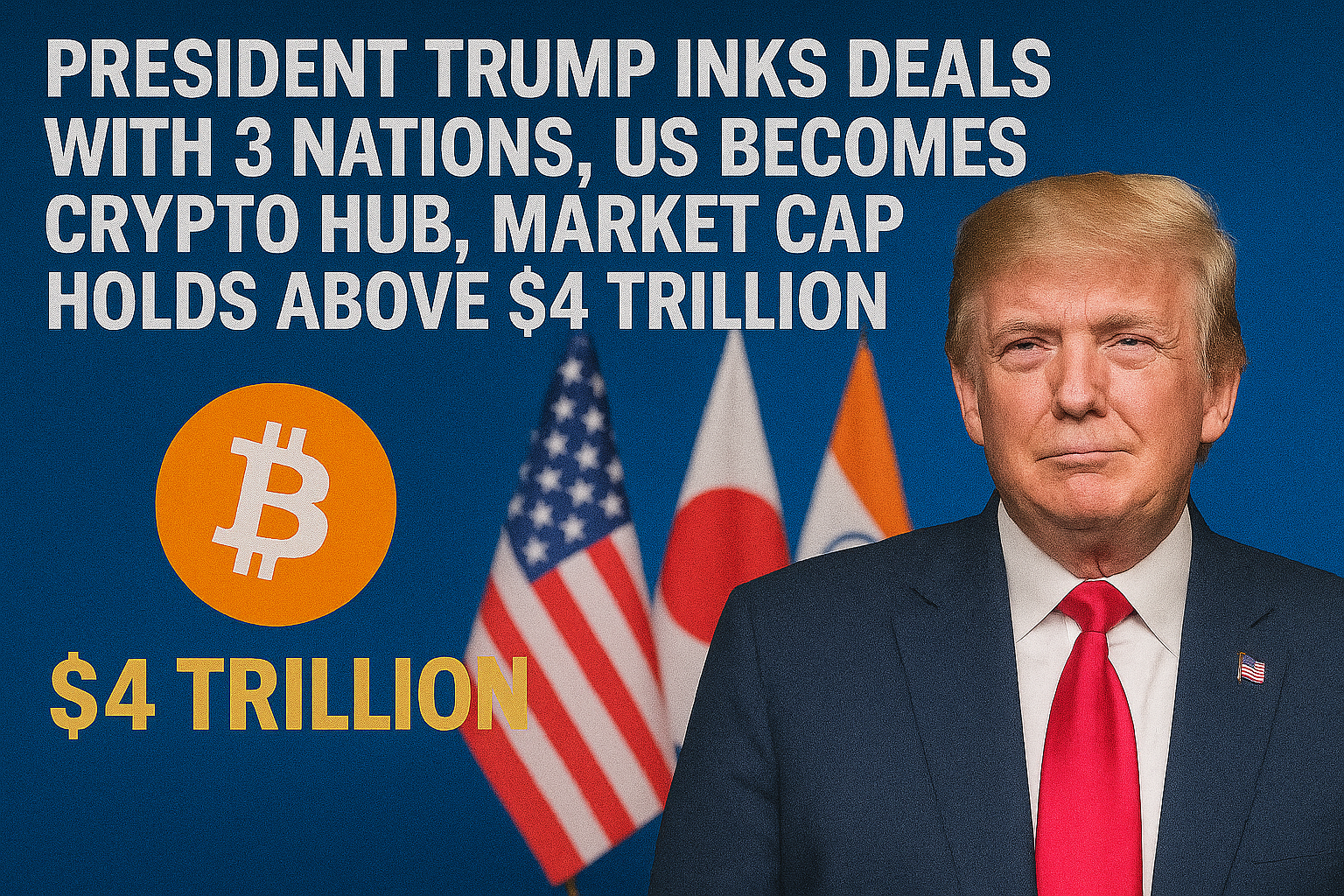
.png)




